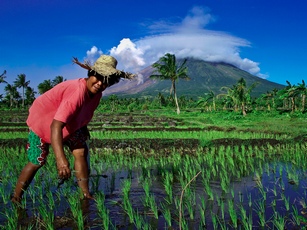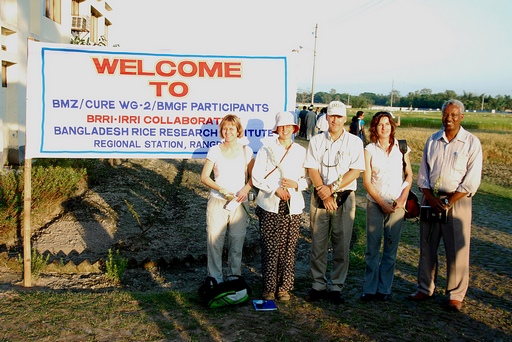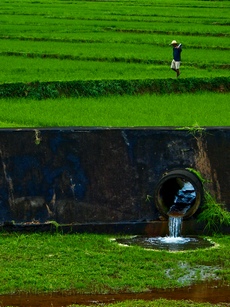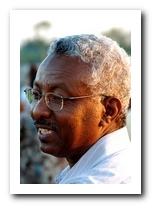I was forever inquisitive as to how things grew, and questioning when they didn’t grow well. I think it’s what got me interested in plant science.”
– Abdelbagi Ismail, Plant Physiologist and Principal Scientist, International Rice Research Institute.
Today, we talk to Abdel. His riveting voyage in plant science starts on the bountiful banks of the Nile, before we sail on to Asia’s ricelands. We’ll make a short stopover in USA for cowpeas and drought in between, then proceed to to our main meal of rice, spiced and seasoned with a strong dash of salt-and-P.
It’s not just about food, but also family: you’ll get to meet a sister Challenge Programme along the way. Intrigued? We hope so, so please do read on!
‘A’ for Abdel and agriculture – an early passion for plants
From a tender age, Abdel was fascinated by agriculture.
Growing up on a small family farm backing onto the banks of the Nile in the Northern State of Sudan, he helped his parents in tilling the land, sowing and harvesting.
Abdel reminisces, “It was a relaxing paradise with all types of fruit growing around you year-round. Working and living on a farm, I was forever inquisitive as to how things grew, and questioning when they didn’t grow well. I think it’s what got me interested in plant science.”
Armed with a Bachelor’s and Master’s in Agricultural Sciences (agronomy, crop production, water relations) from the University of Khartoum, Sudan, Abdel moved to the University of California, Riverside, USA, for a PhD on drought tolerance in cowpeas.
“It was the first time I had ever left Africa, and it was a real eye-opener,” Abdel recalls. “It was a fantastic new page in my career too, as I was working with world-class professors and mentors. I chose to work on cowpeas because it is a hardy crop that can be grown in dry conditions which were – and still are – becoming more prevalent in sub-Saharan Africa.” (you can take a sidetrack here, to see our research on cowpeas)
What interests me is how some societies have survived, and, in some cases, flourished because they invested in improving their plants and crops to adapt and adjust to weather adversities.”
 Navigating away from the Nile, and discovering his niche
Navigating away from the Nile, and discovering his niche
For this native son of the Nile, this move was a watershed. It marked the start of a dedicated – and still ongoing – career quest to understand how plants can adapt to better tolerate extreme environmental stresses such as higher and lower temperatures, too much or too little water, salinity, and nutrient imbalances.
“Abiotic stresses have had, and continue to have, a major impact on human life, with some societies disappearing altogether because of changes in soils or climate,” says Abdel. “What interests me is how some societies have survived, and, in some cases, flourished because they invested in improving their plants and crops to adapt and adjust to weather adversities.”
From time immemorial, the communities around the Nile where Abdel spent his childhood are a prime example of this flourishing against adversity.
IRRI beckons, and nurtures
In 2000, Abdel accepted a position at the International Rice Research Institute (IRRI) in The Philippines.
“I saw it as an opportunity to convert knowledge and scientific discoveries into resources that could help needy farmers,” explains Abdel.
Abdel confesses that when he joined IRRI, his intention was to stay for a short stint and then move on. But as he became more involved in his work, he felt IRRI offered him the best opportunity to build his career, and to contribute to global food-security issues.
“I’ve been here for 12 years now. IRRI really is a great place to grow as a person and a researcher, and to learn how to become a leader.”
Having GCP provide ongoing funding and support for public institutions to conduct a long-term project has been pivotal to the success of the project. It has given us all the security we need to focus on conducting the complex research required…”
Trailblazing for GCP : a much-needed dash of ‘salt-and-P’
In 2004, Abdel proposed a collaborative project between nine different research organisations, across seven countries, to improve salt tolerance and phosphorus uptake efficiency in rice. The work was funded by a sister CGIAR Challenge Programme on Water and Food (CPWF).
This work caught – and held – GCP’s attention, because it sought to overcome a problem that negatively affects the lives of tens of thousands of rice growers around the world. The two resultant GCP-funded IRRI-led projects involved partners from Bangladesh, India, Indonesia, Vietnam and USA’s University of California, Davis. Globally, more than 15 million hectares of ricelands are saline, and more than one-third of all ricelands are phosphorus-deficient, hitting poor communities hardest.
In the nine years since, and together with his colleagues and partners, Abdel has developed the proposal into a productive and coherent suite of interconnected projects: he has managed and overseen most of the progress made during the discovery of the genes associated with salinity tolerance (Saltol) and phosphorus uptake (Pup1), and their insertion into well-known rice varieties that farmers in Bangladesh, Indonesia and The Philippines know and trust.

It’s all about rice: salt tolerance (Saltol) ‘meets’ phosphorus uptake (Pup1) in Bangladesh. Abdel is on the extreme right. Next to him is Sigrid Heuer, Principal Investigator of the ‘Pup1’ work.
Keeping the faith, and going where no rice has gone before…
A long-term horizon helps, since, just like art, science cannot be hurried: “Having GCP provide ongoing funding and support for public institutions to conduct a long-term project has been pivotal to the success of the project,” Abdel emphasises.
“It has given us all the security we need to focus on conducting the complex research required to advance our knowledge about these genes, then breed and develop popular varieties containing then. In some cases, we have developed lines with doubled yields, and grown rice in areas where it has never been grown before because the land was too saline.”
For Abdel, such achievements are heartening as they provide farmers with greater food and income security, which in turn improves their and their community’s livelihoods.
“It brings a smile to my face whenever I think about how our work helps to produce higher-yielding crops for poverty-stricken countries whose farmers often can only afford to grow one crop per year,” says Abdel sincerely.
Abdel continues to build upon, and has even employed, partners he has met through the GCP project…”We want to improve their capacity to take up new breeding techniques, such as the use of molecular markers, which can reduce the time it takes to breed new varieties from six to 10 years to two to three years…”
Continually building on the best
So what’s in store for the future?
Having discovered the Saltol gene and developed experimental lines, his team is now training breeders from country breeding programmes on how they can successfully breed for salt tolerance and tolerance of other abiotic stresses using their own popular varieties, thereby fortifying popular varieties with these much-needed tolerance traits.
“We want to improve their capacity to take up new breeding techniques, such as the use of molecular markers, which can reduce the time it takes to breed new varieties from six to 10 years to two to three years,” reveals Abdel. “This will allow them to breed for crops quicker, in response to ever-changing and extreme climate conditions.”
As for his other projects with IRRI, Abdel continues to build upon, and has even employed, partners he has met through the GCP project to help him with his Stress tolerant rice for Africa and South Asia (STRASA) project.
GCP helped IRRI attract support from other funders…”
Going further, faster, together… five and counting, still learning, and the future looks bright
STRASA is almost five years old and has another five years left to run.
“GCP helped IRRI to attract additional support from other funders, such as the Bill & Melinda Gates Foundation, to start STRASA, which seeks to support the development and distribution of stress-tolerant varieties in Africa and South Asia,” Abdel explains.
Abdel’s parting words? “I’m still committed to understand how plants can be manipulated to adapt to, and better tolerate, extreme environmental stresses, which seems more feasible today than it has ever been before.”
Links
- For an early history of Abdel’s work (2005–2006) see pp 36–40 here, and pp 26–28 here
- Abdel’s research partners in Bangladesh and Indonesia
- Complementary research and findings on improving rice phosphorus uptake









